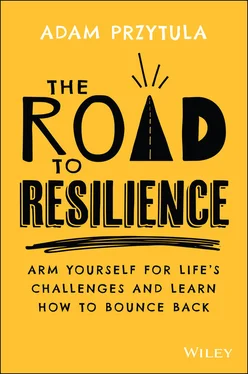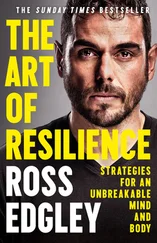It's important to be aware of what your coping mechanisms are. They act as important red flags for ANTs and negative feelings. If you find yourself needing to use your coping mechanism to ‘feel better’, then it's important to question why .
During my teenage years, I turned to binge eating. I wasn't self‐aware. I didn't realise I was binging on lollies, chips and chocolate to try and numb the emotional pain I was experiencing. I just knew that eating junk food made me feel better. As a young kid, I'd always raided Oma's pantry for a couple of treats after school. But, by the time I reached high school, one or two chocolate bars weren't enough. Spending so much time alone at home, I smashed bags of the stuff, eating beyond the point of comfort until I felt physically sick.
I also developed a screen addiction. It started with movies and gaming, but soon the ‘fix’ I was getting from them wasn’t enough. I gravitated towards pornography. What started out as a ‘feel‐good’ coping mechanism descended into mental addiction.
As my junk food, screen and pornography addictions worsened, I began to feel more depressed and anxious. I started staying up all night because I didn't want to go to bed and have to face my thoughts. Inevitably, sleep deprivation made all of my problems worse. It was a revolving door of self‐abuse.
WHAT SHOULD I HAVE DONE DIFFERENTLY?
I depended on unhealthy behaviours (binge eating and staying up all night to watch TV, game and watch pornography) to help me feel better. This is the opposite of being self‐aware.
I should have paid attention to my ANTs and challenged them. Instead, I ignored how low I was feeling. The result?
My self‐esteem hit rock bottom.

By the age of 11, I was struggling but trying to put on a brave face.
Self‐awareness is about paying attention to your self and being aware of your thoughts:
Pay attention to your thoughts.
Challenge ANTs.
Pay attention to your feelings.
If you're feeling a certain way, ask why.
Identify your coping mechanisms: these behaviours are red flags.
Practising the following steps will help you overcome relying on coping mechanisms.
Try this
Be aware of your coping mechanisms
Answer these questions in your head and think about your answers intently.
1 What is one of your coping mechanisms?
2 When was the last time you used your coping mechanism?
3 How were you feeling before you used it? (It might be one dominant feeling, such as fear or anger. Or, it might be a mixture of feelings, such as feeling excited and nervous.)
4 What triggered you to have these feelings?
5 What ANT did you experience?
6 Challenge this ANT. Is it true?
Practise this exercise as often as you can. Next time you find yourself turning towards a coping mechanism, follow the steps above and see if you can identify the thoughts and feelings that caused you to need it. The more often you try to be self‐aware, the easier it becomes.
Choose your friends and relationships wisely
There's whole chapters about friendships and relationships later in this book (see chapters 7and 10) because healthy relationships (including friendships) are essential for healthy self‐esteem.
In a nutshell, if we have healthy friendships, we feel secure. We feel confident. We feel accepted. Regardless of whether we screw up and make a mistake.
Remember, as human beings we have two psychological needs:
We need to feel loved.
We need to feel like we belong.
Real, healthy friendships fulfil this need.
The quality of friendships is more important than the quantity.
Banter can be fun. It helps us to connect with each other, but we should come away from it feeling good about ourselves. If our friends tear us to shreds and don't support us, the constant negativity will start to bring us down.
Relationships have a huge effect on our self‐esteem. Why?
Because they're risky. Connecting on a deep level is the most rewarding thing we'll ever go through. It can also be the most painful.
Your relationship should make you feel supported, valued and accepted.
Arguing is normal. It forms a part of every relationship. However, there's a difference between healthy conflict and destructive conflict.
Being grateful means focusing on the good stuff in your life and feeling thankful instead of focusing on the negative things.
If you practise gratitude, it boosts your self‐esteem. How?
Replacing ANTs with positive thinking makes you feel good. This makes you act in ways that make you feel even better. (Remember the self‐esteem spiral.)
HOW TO PRACTISE GRATITUDE
Practising gratitude is an extension of being self‐aware. It involves using your senses (see, hear, taste, feel, smell) to be mindful. That is, to be in the moment .
Being grateful means practising self‐awareness: paying attention to the thoughts you are having. Taking notice of how you are feeling. Replacing ANTs with positive thinking.
Try this
How are you thinking and feeling right now?
Take a moment to tune into your senses:
What can you see?
What can you hear?
What can you taste?
What can you smell?
What can you feel?
Reflect on these sensations to answer the following questions:
1 What are you thinking about?
2 If your thoughts are ANTs, can you reframe them into positive thoughts?
3 How do your positive thoughts make you feel?
4 Based on this thought and these feelings, what do you have to be grateful for?
Here’s an example of what I’m thinking and how I’m feeling right now.
Right now, I can see my older son, Cale, in the rear‐view mirror, and I hear him laughing at me as I describe this to you. I can feel the sun beaming through the window and it's warm against my skin. I can taste syrupy sugar because we stopped off for a coke and I can smell a mixture of sweat, air‐con and fresh fruit because our grocery shopping is on the back seat.
I'm thinking that seeing Cale reminds me that he's the one really good thing to come out of my previous marriage. Cale is really funny, and we've had a great weekend together. The weather has been beautiful, and at this time of the year, we can buy strawberries together from ‘our spot’. I swear they are the best strawberries in WA.
I’m feeling loved, relaxed and happy. I’m in a good mood.
I’m grateful I have Cale.
I’m grateful it’s spring.
I’m grateful Cale and I got to spend the weekend together.
I’m grateful strawberries are for sale.
WHY PRACTISING GRATITUDE BOOSTS OUR SELF‐ESTEEM
Choosing to feel grateful for what we have, instead of dwelling on what we don't have, has the effect of rewiring our brain. Remember I mentioned earlier about how when we practise a thought over and over, the neural connection becomes stronger? When we spend time practising gratitude, thinking positively becomes automatic. We behave in a positive way that causes us to feel good about ourselves. It's a great way to boost our self‐esteem, and it has the added effect of attracting others to us.
Читать дальше













